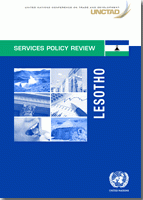
For many years, UNCTAD has been emphasizing the importance for developing countries of strengthening and diversifying their service sectors. Since 1990, the share of services in the national gross domestic product (GDP) in developed countries grew from 64 per cent to 72 per cent. By contrast, in developing countries, the share of services in GDP grew from 46 per cent to 50 per cent, with services accounting for 37 per cent of formal employment. These figures suggest a large untapped potential for developing countries to advance the development of their service sectors.
The Accra Accord states that “The services economy is the new frontier for the expansion of trade, productivity and competitiveness, and for the provision of essential services and universal access”. The Accord calls upon UNCTAD to assist developing countries and countries with economies in transition to establish regulatory and institutional frameworks and cooperative mechanisms to strengthen the capacity, efficiency and competitiveness of their services sector, and to increase their participation in global services production and trade, including by “providing support in national services assessment and policy reviews”. UNCTAD developed its tailormade Services Policy Reviews (SPRs) in response to the Accra Accord. The Doha Mandate reiterates that the development of, and access to, services, supported by adequate regulatory and institutional frameworks, are important for sound socio-economic development. UNCTAD members have therefore requested UNCTAD to continue its work on services.
The services sector in the Kingdom of Lesotho is the largest sector in the economy, with a share of GDP of 59.7 per cent in 2010. This share has, however, declined over the last two decades (from 62.4 per cent in 1990) as the contribution of industry has expanded. The Lesotho SPR focuses on three areas within the services sector, namely tourism, and financial and professional medical services.
In conducting the SPR, UNCTAD undertook a desk study on the services sector of Lesotho. The desk study recommended that national services development strategies should be developed through participative consultations at the national level with all key actors, including parastatal institutions, potential foreign and domestic investors, the private sector, labour groups and academia. This will not only ensure buy-in and support, but will also generate desirable spill-in and spill-over effects among related economic sectors. The study also suggested that a master plan, which outlines not only national strategies but also defines a process and series of practical steps through which strategic objectives should be pursued. These strategic objectives should be based on a national consultation process and should provide a strategy for developing the services sector and services trade to maximize the expected development gains. The recommendations of the desk study aim to assist the Government of Lesotho in its development of such a master plan and in its determination of the way forward in terms of pacing and sequencing of further trade policy and sector reforms.
A team of experts, with support from UNCTAD, engaged with a broad group of stakeholders from the Government, industry, academia and civil society to identify challenges and opportunities in the three sectors. The stakeholders were involved through interviews and questionnaires, and provided inputs to the report. They also participated actively in two national workshops, the second of which served to validate the findings of the SPR report as well as to refine and adopt horizontal and sector-specific recommendations, in addition to discussing which national entities could be responsible for leading the implementation of each adopted recommendation.
The UNCTAD team worked closely with Ms. Mary Motebang, Director of Trade, Ministry of Trade and Industry, Cooperatives and Marketing as well as with His Excellency Ambassador Mothae Anthony Maruping and Mr. Moshe Kao of the Permanent Mission of the Kingdom of Lesotho to the United Nations Office in Geneva.
The review process included an analysis of the following elements: current policy framework for tourism; financial and professional medical services; regulatory and institutional challenges inhibiting sectoral development; national development objectives; prospective policy options to strengthen domestic supply capacity and small and medium-sized enterprise (SME) competitiveness; the potential impacts of services and services trade liberalization on sectoral foreign direct investment (FDI), SMEs, efficiency, employment, access to foreign markets and universal access to basic services.
The resulting wide-ranging recommendations from the SPR are set out in detail in the body of this report and include cross-sectoral recommendations that are designed to strengthen the services sector broadly.
The recommendations address the following fields:
- The development of a national services development strategy plan;
- An investigation of ways to improve infrastructure services that support the services sector, including the instigation of innovative financing models and public–private partnerships;
- An exploration of ways to boost the employment creation impact of the main service sectors in Lesotho;
- The adoption of competition law and establishment of a competition authority;
- Enactment of a comprehensive investment code;
- Improvement of Lesotho’s business climate through the implementation of the new Companies Act (2011);
- Further efforts to eliminate red tape and simplify regulatory processes and procedures;
- Greater use of district bodies, authorities and structures in the promotion of tourism, monitoring and evaluation of health professionals;
- Provision of financial services;
- The securing of access to other markets.
The report also includes recommendations and an action plan specific to each of the three sectors analysed in the review.
I hope that the contents of this publication will contribute to providing a strategic vision for the development of Lesotho’s services sector, and assist the country to continue to derive development benefits from trade in services.
Secretary-General of UNCTAD


